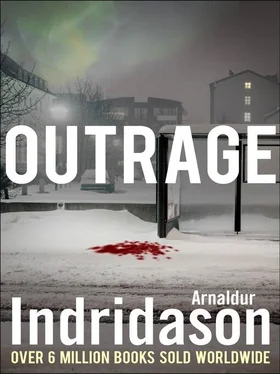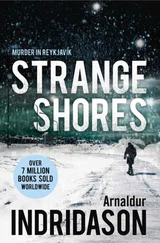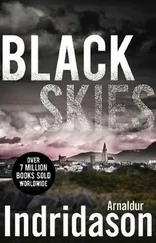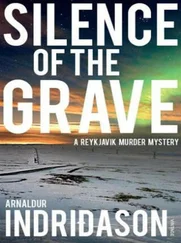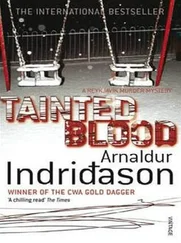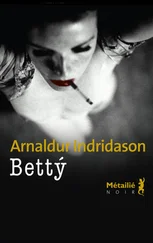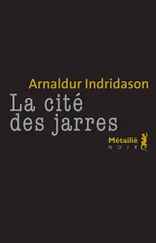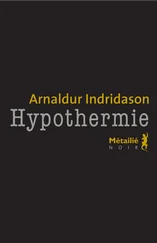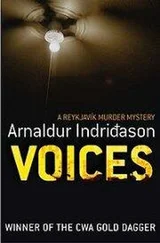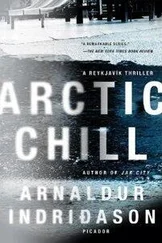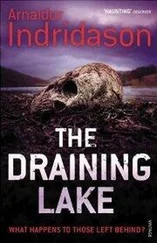Arnaldur Indridason - Outrage
Здесь есть возможность читать онлайн «Arnaldur Indridason - Outrage» весь текст электронной книги совершенно бесплатно (целиком полную версию без сокращений). В некоторых случаях можно слушать аудио, скачать через торрент в формате fb2 и присутствует краткое содержание. Год выпуска: 0101, Издательство: Random House Canada, Жанр: Полицейский детектив, на английском языке. Описание произведения, (предисловие) а так же отзывы посетителей доступны на портале библиотеки ЛибКат.
- Название:Outrage
- Автор:
- Издательство:Random House Canada
- Жанр:
- Год:0101
- ISBN:нет данных
- Рейтинг книги:3 / 5. Голосов: 1
-
Избранное:Добавить в избранное
- Отзывы:
-
Ваша оценка:
- 60
- 1
- 2
- 3
- 4
- 5
Outrage: краткое содержание, описание и аннотация
Предлагаем к чтению аннотацию, описание, краткое содержание или предисловие (зависит от того, что написал сам автор книги «Outrage»). Если вы не нашли необходимую информацию о книге — напишите в комментариях, мы постараемся отыскать её.
Outrage — читать онлайн бесплатно полную книгу (весь текст) целиком
Ниже представлен текст книги, разбитый по страницам. Система сохранения места последней прочитанной страницы, позволяет с удобством читать онлайн бесплатно книгу «Outrage», без необходимости каждый раз заново искать на чём Вы остановились. Поставьте закладку, и сможете в любой момент перейти на страницу, на которой закончили чтение.
Интервал:
Закладка:
‘Yes, you were.’
‘So what went wrong?’
‘Birkir never thought of you as his mother,’ said Theodóra. ‘He told Valthór, but you mustn’t say I told you.’
‘Valthór tells you all sorts of odd things.’
‘He said Birkir had had enough of us, his foster family.’
‘Could we have done anything differently?’ asked Elínborg.
‘No, I’m sure we couldn’t.’
Elínborg kissed her daughter’s forehead. ‘Goodnight, sweetheart.’
The questioning of Konrád and Nína continued after Elínborg left. They were asked repeatedly about their movements on the night of the attack, and their story remained unchanged. Their accounts were very consistent but, as Elínborg pointed out, they had had plenty of time to agree on a story. The witness who had reported seeing a woman in the passenger seat of a car in Thingholt when he was walking home that night was brought in to identify Konrád’s wife. He was sure that she was the woman he had seen.
The next afternoon Elínborg entered the interview room where Konrád was being held. Konrád was clearly worn down by being locked up and bombarded with questions, and by his anxiety about his family, especially Nína. He asked Elínborg how his daughter was, and she assured him that Nína was managing as well as could be expected. Everybody wanted this process to be over. ‘Wouldn’t you expect to find blood on my daughter’s clothes, or on her hands?’ demanded Konrád in response to a barrage of questions about Nína’s part in Runólfur’s death. ‘I didn’t see any bloodstains on her — not on her clothes, not on her hands. There was no blood.’
‘You said you didn’t notice.’
‘I remember now.’
‘Can you prove it?’
‘No, I can’t prove it. I know I should have called the police right away, got them to come, let them see the evidence, and shown them that Nína could not have killed him. And I was wrong not to take Nína to the rape-trauma centre and arrange counselling. We should have done all those things, I realise that. We shouldn’t have run away. It was wrong, and it’s rebounded on us. But you must believe me. Nína could never have done it. Never.’
Elínborg looked at the police officers who were conducting the interview. They beckoned her to join them.
‘I think your daughter is ready to confess,’ she said. ‘Nína has all but told me she killed Runólfur. Her only regret is that she doesn’t remember cutting his throat.’
‘He raped her,’ said Konrád. ‘That bloody bastard raped her.’
Elínborg had not heard Konrád swear before. ‘That gives us all the more reason to believe that when she came round she slipped him the same drug that he had used on her, overpowered him, and then slit his throat. Perhaps she tricked him — spiked his drink, then washed the glass. A lot of evidence points to that.’
‘This makes me sick,’ countered Konrád.
‘Unless it was you?’ said Elínborg.
‘Who was this Runólfur?’ asked Konrád. ‘What kind of a man was he?’
‘I don’t know how to answer that,’ replied Elínborg. ‘We never had any dealings with him while he was alive. You must appreciate our problem. Although your daughter says she was raped, we have no evidence. Why should we believe her? Why should we believe you ?’
‘You can believe everything she says.’
‘I want to,’ said Elínborg. ‘But there are problems with her story.’
‘I’ve never known her to lie. Not to me, not to her mother, nor to anyone else. It breaks my heart to see her caught up in this awful mess, this nightmare. It’s appalling. I’d do anything for it to be over. Anything at all.’
‘You know he was wearing Nína’s T-shirt?’
‘I realised that later. I took my jacket and wrapped it around Nína, then picked up her clothes. I ought to have been more careful. I knew you were on to us as soon as you asked me about San Francisco. That was no routine enquiry.’
‘You said you wished it had been you that killed him. Nína says she wishes she remembered cutting his throat. Which of you did it? Are you prepared to tell me now?’
‘Does Nína say she did it?’
‘Virtually.’
‘I’m not confessing to anything,’ said Konrád. ‘We’re innocent. You should believe us, and put a stop to all this.’
27
Elínborg spent the rest of the day shopping. She bought a selection of healthy foods, which she was forever trying to encourage her sons and their father to eat but with limited success. She bought a steak; she was planning to keep her promise to serve Valthór his favourite. He liked his meat rare, but Elínborg was not keen on bloody meat. She relaxed as she shopped, and tried not to think about the case which was weighing so heavily on her. Into the trolley went a jar of artichoke hearts, Colombian coffee, Icelandic yoghurt.
When she got home she soaked in a hot bath, and unwound so completely that she fell fast asleep. She had not realised how tired the strain of the last few days had left her. She awoke to hear someone moving around the house — one of the children, home from school. She tried in vain to keep her mind off her work. Edvard kept entering her mind. His squalid little house, the rusty old banger parked outside, and the twisted branches of the tree that loomed over the roof like eerie claws. The more she thought about Lilja, the more repulsive she found the house and its owner, Edvard, who shuffled around the rooms, hunched, unshaven, with unkempt hair, nervy and graceless. She could not honestly imagine him hurting anyone, but that proved nothing. Edvard’s character could not be judged by outward appearances, except for the obvious fact that he was a slob.
Elínborg wanted to go back up to Akranes, to talk to more people who had known Lilja and Edvard. His colleagues on the college staff might have information that they regarded as unimportant, but could be useful to her. She wanted to re-interview Lilja’s mother, who had taken refuge in religion. She might also have to question the girl’s father, who had dealt with his grief by withdrawal and silence. It would be difficult to interview them without anything firm to go on, and Elínborg was not sure how far she ought to push it. She did not want to give them false hope. That would be no help to anyone.
She wanted to find out more about Runólfur, too. Konrád had asked her who the man was, and what the police knew about him, and the answer was: not much. Perhaps she should fly back to his village and interview more of the locals.
Elínborg changed out of her work clothes, and went into the kitchen. Theodóra had brought two friends home and they were in her room. Valthór too was in his room: she decided not to disturb him. She wanted to avoid conflict for the rest of the evening.
Before turning her attention to the steak, Elínborg unpacked two cuts of lamb to which she had treated herself for one of her culinary experiments. She went out into the back garden and lit the barbecue, to give it enough time to get good and hot. She took out her tandoori pot and mixed a marinade using Icelandic herbs. She cut the lamb into chunks, which she plunged into the marinade and set aside for half an hour. The grill was very hot when she lifted the tandoori pot on to it along with several large potatoes, which she baked among the coals to serve with the steak. She called Teddi, who said he was on his way home.
Whenever Elínborg focused on her cooking she attained a rare state of calm. She permitted herself to slow down and retreat from the stressful daily round, to concentrate on something other than work and take a break from the family. She emptied her mind of everything but the consideration of different ingredients, and how she could apply her insight and artistry to producing perfection from chaos. In her kitchen she found an outlet for her creativity: she took the ingredients and transformed their nature, taste, texture, aroma. For Elínborg the three stages of cookery — preparation, cooking, and eating — were a recipe for life itself.
Читать дальшеИнтервал:
Закладка:
Похожие книги на «Outrage»
Представляем Вашему вниманию похожие книги на «Outrage» списком для выбора. Мы отобрали схожую по названию и смыслу литературу в надежде предоставить читателям больше вариантов отыскать новые, интересные, ещё непрочитанные произведения.
Обсуждение, отзывы о книге «Outrage» и просто собственные мнения читателей. Оставьте ваши комментарии, напишите, что Вы думаете о произведении, его смысле или главных героях. Укажите что конкретно понравилось, а что нет, и почему Вы так считаете.
